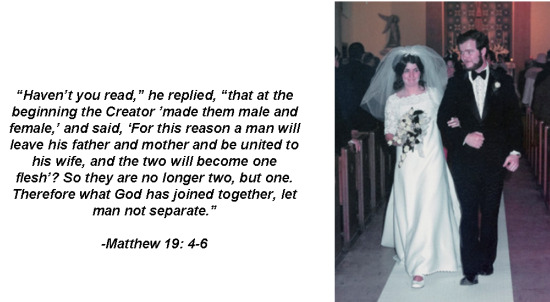Boomer Marriage
Boomer marriage - at our age, it likely prompts different reactions among us. For those of us still married, it's wanting to maintain or improve the marriage we have. For those of us currently single - remember the 30% figure from our discussion on boomer dating - it could mean wanting to make sure we marry the right person, this time! And for others still, it could mean avoiding traditional marriage altogether, opting instead for the marriage alternative - cohabitation.
So how do we "learn" boomer marriage, and see if it's the right thing for us? For all the classes we took in school growing up, where was Marriage 101 (for an institution as old as time itself, how thick would that textbook have been)? Is it trial and error from our own experiences and those of others, i.e., first from our parents and then our siblings and friends? Through media accounts of celebrity and non-celebrity couples, displaying - sometimes graphically - what works and what doesn't? Through psychological studies and counseling? And ultimately, what does the Bible say about marriage?
Boomer marriage is a most complex topic to be sure, but experience is our best teacher, and we can start by sharing some of the things that we do know.
Boomer Marriage - Choosing Our Partner
Can we marry the right person, or better stated, the person that is "right" for us? Are we marrying that right person? Did we marry that right person? Questions like these - assuming we thought about them at all - were tough enough the first time around! But now as we enter our next stage of life, how do we answer them the second time around, or until we get boomer marriage right?
By now we have found no shortage of marital advice, from family, friends, relationship experts and others, if we are open to it. Perhaps the most fundamental, and the easiest to always remember, is the "4H test": Heaven, Heart, Head, and Hands.
- Heaven
Does this person accept the Bible

as God's inspired word, and hence our guidebook for living? In times of trouble or problems in our marriage, do we agree that Bible teachings give us peace of mind by putting all of our problems in proper perspective? Do we agree that the answers to all of life's so- called mysteries, at least the ones worth solving, can be found in the Bible?
Recall our discussion on dating and being relationship ready (scroll over to Boomer Dating). Faith is fundamental to our daily lives, and like dating, choosing a boomer marriage partner with a faith different from our own in hopes of a conversion is a long- shot at best. If your prospective partner is willing to change, then allow sufficient time for it to happen and to be convinced of its sincerity before proceeding.
- Heart
- Head
Head also prompts some very practical questions, particularly for boomer marriage. Is there an intellectual match (remember that education level is different than intelligence)? Is there a shared vision of how and where to live, especially come retirement time? Is there agreement on how to handle family responsibilities from previous marriages? How about finances and property, and the rights for inheritance? Are pre-nuptial agreements going to be important? Answers to these types of questions determine our "fit".
- Hands

shallow, cos- metic and ultimately fleeting, but physical attraction to each other is still an essential ingredient for many of us. Needless to say, the qualities of our physical attraction will certainly change over time as we age, and it's essential that we recognize that right from the start. But it's no less important to touch, to hold, and to physically connect ("to lay hands on each other") and display our love to each other in these ways. It's yet another form of intimate communication between the sexes, and one that we can share and find pleasure in at any age. It's a real part of "chemistry", and it's important that both partners find a reasonable match, a fit, in this area as well (scroll over to Boomer Sex).
Boomer Marriage - Realities
Fall in love, get married, live happily ever after - storybook stuff, but we do so much better when we know and prepare for the realities. First of all, those feelings of euphoria, being swept off our feet, will fade in just a few short years, if even that long. After all, who could stay on such an emotional high for "ever after"? Would we even want to? How could we eat, sleep, work, and meet our everyday responsibilities if we were so pre-occupied?
When this reality sets in, where do we look to regain

some of that early euphoria, or other level of satisfaction? Is it for something new, be it a person or a "thing"? Doing so opens the door to all kinds of problems, including infidelity or other excessive behavior. We know those pursuits only provide temporary satisfaction, if even that, and when it runs out the same negative cycle begins all over again.
Rather than looking outside of our marriage for that next fulfillment (and never finding it), we do best when we start looking inside of it, starting with our self. Much like a workout program to get ourselves fit, there are certain exercises we can do to make our boomer marriage stronger, and ourselves a lot happier:
- Be Self-Aware
- Take Responsibility
- Communicate
- Appreciate Differences
- Acknowledge
- Share Some Interests
- Build Trust
- Practice Intimacy
- Grow
- Commit
What do you believe in? What are your personal values, your goals in life, your sense of purpose? Look to match these same pursuits with those of your partner.
Be accountable for your role, your part in the relationship. As problems and frustrations arise, accept responsibility for your own actions. Sharing blame instead of shifting it, helps each partner understand root causes to the problems, avoids greater frustrations, and leads to joint solutions.
Know when it's (your) time to talk, when it's (your) time to listen, and appreciate the difference between the two. Share your innermost thoughts and feelings clearly and honestly, and listen carefully to those of your partner. Demonstrate your sincerity to communicate in this way, through love, kindness, and compassion.
Get beyond the simple acknowledgment that men and women are hard-wired differently. Understand and appreciate the real distinctions in personality, preferences, style, habits, and traits. How dull would things be if we married a clone of our self?
Identify not just the "bad things" that you find in your boomer marriage, i.e., the things that upset you most, but also the good things for which you are most grateful, and share those with your partner. Acknowledge your own faults and shortcomings, asking what things can be done differently to the satisfaction of both partners.
Discover one or more of your partner's

greatest passions, whether active or passive, to see why it is so. It may or may not be something that you find nearly as much passion for, but learn- ing about it or trying it shows that you value your partner and that you want to spend some time together. Even if it's "just not your thing", hav- ing a basic understanding of the topic or activity stimulates conversation, and shows that you support your partner's quest for fulfillment.
Believe that you can depend on your partner. One of the strongest statements we make in any relationship is that we trust our partner completely. In boomer marriage, we depend not only on fidelity, but the safe pursuit of all the goals we share regarding family, health and financial security.
Make love, not war! More than a catch phrase from our boomer generation, it's the way we reveal the most private things about each other, to each other. Making love goes beyond even the intimacy of intercourse. It's the deepest sharing of whom we are as an individual, and the total comfort we show in doing so, with absolutely no fear of judgment or reprisal from our partner.
Know that our lives are ruled by the choices we make, and not by the feelings we have at any given moment. Feelings are temporary; choices are lasting. A boomer marriage grows when each partner willingly chooses to make changes, adapting to the needs of the other, because each knows that it brings greater happiness to the other.
When all else seems to fail, know that commitment is the ultimate bond in your boomer marriage. Remember your wedding vows, each of you holding a candle and lighting it from a single flame, two individuals joined as a union "for better of for worse 'til death do you part". Committed partners will endure the problems and challenges that life together will bring, sometimes resolving them and sometimes just outlasting them, but always committing to get past them.
Boomer Marriage - Did We Marry the Right Person?
It's the phenomenon of cold feet, a malady sometimes thought to occur more often in men than women. But seriously, before and even after we get married, it's only natural to ask this question. But if feelings of insecurity prevent us from even asking, then we may have some problems. The starting point is that your spouse has no destructive behavior, i.e., is not unfaithful, violent, cruel, mentally or physically abusive, a substance abuser, temperamental, dishonest, lazy, sloppy, or extravagant. Further, the "right" spouse for you:
- supports your emotional health and self-reliance - does not hold him/herself up as your sole reason for living.
- practices random acts of love, saying "I love you" not only in words but in deeds (the back rubs and neck massages, flowers anytime, love notes on the mirror, shared household duties and chores).
- is patient because he/she knows that you're worth waiting for.
- is your best friend and one with whom you enjoy spending time and sharing experiences.
- believes as you do in your values and goals, and works with you to achieve them (aka "equally yoked").
- matches your sense of healthy lifestyle (eating, exercise habits, balance between work and play).
- matches your sex drive and satisfaction levels.
- understands that progressing through life brings changes, and readily adapts to those changes.
- is honest and straightforward with you at all times, but always with kindness and respect.
- trusts you in all instances (no worry about your choice of friends, phone calls, hobbies, or alone time).
- respects and supports your responsibilities to other family members and friends gathered from a previous relationship.
Boomer Marriage - What Does the Bible Say?
The keys to boomer marriage - or for that matter, marriage at any age - are found in the Bible, as are the answers to all of life's so-called mysteries!

First and foremost, God created the institution of marriage, just as He created all other things in this world, and so we take it very seriously. During His earthly ministry, Jesus himself talked about marriage in response to a question the Pharisees had asked him (in fact trying to trick Him): "Is it lawful for a man to divorce his wife for any and every reason?" [Matthew 19: 3]

Jesus talked about infidelity being the only basis for divorce, and the implications that divorce has upon adultery: "I tell you that anyone who divorces his wife except for marital unfaithfulness, and marries another woman commits adultery." [Matthew 19: 9] Similarly, in His Sermon on the Mount (The Beatitudes), Jesus said, "But I tell you that anyone who divorces his wife, except for marital unfaithfulness, causes her to commit adultery, and anyone who marries a woman so divorced commits adultery." [Matthew 5: 32] From these examples we understand that fidelity in boomer marriage is sacred, and hence infidelity is certainly basis for divorce. It also gives us essential guidance for re-marriage.
The Bible makes several other references to adultery and its consequences, which range from a husbands revenge to judgment by God:



Ultimately, Jesus makes the most emphatic point about adultery, which includes lustful glances and thoughts. His statement is very forceful; while not necessarily recommending self-mutilation, His point is for us to take the steps needed to avoid adultery at all costs:

Besides adultery, we know there are other elements that cause great harm to marriage, e.g., pornography and self-gratification which fall under the umbrella references to lust and sexual immorality found in the Bible. Whether we are married or single, the Bible gives us clear guidance about self-gratification and how we are to use our bodies:


As human beings created by God, we are given a strong sexual drive to be answered by husband and wife, and to which each are equally entitled:

On this same topic of sex drive, passion and self-control, the Apostle Paul (himself unmarried) gives this advice to the widows and widowers among the people living in the city of Corinth, who had asked him a series of questions:

With respect to divorce, Paul gives some additional guidance for marital commitment, divorce, reconciliation, and living in peace at home (avoiding unsafe, abusive situations):

Return from Boomer Marriage to Baby Boomers R We
